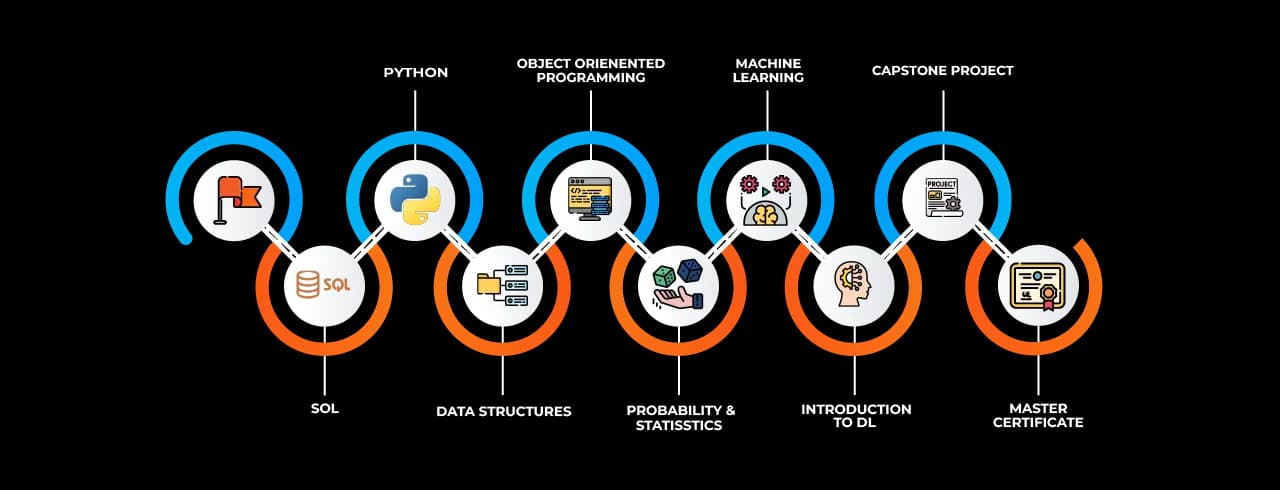About Machine Learning
Machine learning is so widespread these days that people potentially use it repeatedly every day without even recognizing it. Many academics believe it is the most effective technique to get closer to human-level AI. Machine learning Classes in Delhi will teach you about the most successful Machine learning techniques and give you practice implementing and using them on your own. More significantly, not simply about the theoretical underpinnings of learning, but also about gaining the practical know-how needed to apply these strategies to new situations quickly and effectively.
Why is Machine learning necessary?
Machine learning is significant because it allows businesses to see trends in customer behavior and company operating patterns while also assisting in the creation of new goods. Machine learning is so widespread these days that you certainly use it hundreds of times a day without even recognizing it. For many businesses, Machine learning has now become a crucial competitive differentiation.
Types of Machine Learning
The way an algorithm improves to become even more accurate in its predictions is how traditional Machine learning is frequently classified. supervised Machine learning, unsupervised, semi-supervised learning, and reinforcement learning are the four fundamental methodologies. The methodology that data scientists employ is dependent on the sort of data they wish to forecast.
Supervised Learning: Data scientists feed algorithms with labeled training data and identify the variables they want the algorithm to evaluate for correlations in supervised learning. Both the algorithm's input and output are stated.
Unsupervised learning: This is a sort of Machine learning that uses algorithms to train on data that hasn't been tagged. The program looks for important connections in data sets. Algorithms' training data, as well as the predictions or suggestions they provide, are preset.
Semi-supervised: This type of learning is a hybrid of the two previous approaches to Machine learning. Although data scientists may feed an algorithm largely labeled training data, the model is allowed to explore the data and establish its knowledge of the set.
Reinforcement learning: This type of learning is a technique that data scientists use to train a Machine on how to finish a multi-step process with precisely stated rules. Data scientists create an algorithm to complete a task and deliver critical feedback to it as it learns how to do so. However, for the most part, the algorithm chooses which steps to take along the way on its own.
How do these different learning processes work?
All businesses rely on data to function. Data-driven decisions are greatly influencing whether one firm maintains pace with or falls farther behind the competition. Machine learning can unlock the potential of the business and individual data, allowing businesses to make better decisions and stay ahead.
Areas of usage of Machine Learning
Advances in artificial intelligence (AI) for applications such as natural language processing (NLP) and computer vision (CV) are assisting sectors such as financial services, healthcare, and automobiles in accelerating innovation, enhancing the customer experience, and lowering costs. Manufacturers, retailing, healthcare and biosciences, leisure and tourism, banking sectors, and energy, feedstock, and utilities are just a few of the industries that use Machine learning.
The following examples of applications:
Manufacturer: Condition monitoring and predictive maintenance
Retail: Cross-channel marketing and upselling
Healthcare and biological sciences are two fields that are closely related. Identification of the disease and satisfaction with the risk
Travel and hospitality are two of our favorite things. Pricing that changes over time
Services in the financial sector: Regulation and risk analysis
Energy: Optimization of energy demand and supply
How does unsupervised Machine learning work?
Machine learning methods that are unsupervised do not require data to be labeled. They dig through unlabeled data in search of patterns that may be utilized to divide data into subgroups. Unsupervised algorithms make up the majority of deep learning algorithms, including neural networks.
The following tasks are well-suited to unsupervised learning algorithms:
Clustering is the process of dividing a dataset into groups based on their similarity.
Anomaly detection is the process of identifying unexpected data points in a batch of data.
Identifying groups of objects in a data collection that commonly appear together is known as association mining.
Reducing the number of variables in a data collection is known as dimensionality reduction.
Purpose of the Machine learning course
Machine learning is used in a wide variety of uses. One of the most well-known examples of Machine learning in action is the recommendation engine that powers Facebook's news feed. Facebook uses Machine learning to personalize how an individual's feed is shown. When a user reads a certain party's postings frequently, the recommendation engine will start prioritizing that group's engagement in the feed. The engine is working behind the scenes to reinforce recognized trends in the member's online activity. If an individual's browsing habits change and he or she misses to read posts from that area in the following weeks, the news feed will be changed.
Other applications for Machine learning, in addition to recommendation engines, include:
Management of customer interactions. CRM software can scan email and advise salespeople to react to the most essential communications first using Machine learning models. Advanced systems can even suggest possible solutions.
Information for business. Machine learning is used by BI and analytics companies to detect potentially valuable data points, data trends, and anomalies in their software.
Systems that track human resources. Machine learning models may be used by HRIS systems to sort through applications and find the top applicants for a job opening.
Automobiles that operate on their own. A semi-autonomous vehicle might even distinguish a partially visible item and inform the driver using Machine learning techniques.
Virtual assistants are a type of virtual helper. To analyze spoken speech and provide context, smart assistants often blend supervised and unsupervised Machine learning models.
Advantages of Machine Learning
Machine learning has been used in a variety of applications, including forecasting consumer behavior and developing the operating system for self-driving automobiles. When it comes to benefits, Machine learning may assist businesses in better understanding their consumers. Machine learning algorithms can discover relationships and help teams customize product development and marketing campaigns to consumer demand by gathering customer data and associating it with actions over time. Machine learning is a major driver in the business models of several firms. Uber, for example, matches drivers with riders using algorithms. Machine learning is used by Google to surface ride adverts in searches.
Machine Learning future benefits
While Machine learning algorithms have been around for decades, their popularity has risen in tandem with the rise of artificial intelligence. Deep learning models, in particular, are at the heart of today's most powerful artificial intelligence systems. Machine learning platforms are one of the most competitive areas in enterprise technology, with major vendors such as Amazon, Google, Microsoft, IBM, and others racing to sign customers up for platform services that cover the full range of Machine learning activities, such as data collection, data preparation, data classification, model building, training, and application deployment. The Machine learning platform conflicts will only grow as Machine learning becomes more important to company operations and AI becomes more feasible in enterprise settings.
Machine Learning Course under the guidance of SevenMentor
Improved Career Prospects and Growth
Machine learning makes a mockery of anything that can be described as "important" on a financial or global scale. If you want to push your profession to the next level, Machine Learning may help you achieve it. Machine Learning Course in Delhi can also help you get involved in something that is both global and relevant today. Machine learning course provided by us is used in a variety of fields, including image identification, health, cyber security, facial recognition, and others. As a growing number of companies realize that Machine learning has a significant influence on business intelligence, they are opting to invest in it.
Salary Increases are provided
The greatest Machine learning engineers nowadays get paid as much as really well-known athletes! That is not an exaggeration! The average Machine learning engineer income is 8 lakhs per year, according to Glassdoor.co.in - and that's only at the beginning of one's career! A skilled Machine learning expert might take anywhere from 15 to 23 lakhs per year. It is geared at young professionals and includes one-on-one interactions with Industry Mentors, hands-on seminars, and 12 case studies and assignments that can be completed in the real world! As a result, you get to see not just the theoretical side of things, but also the practical side! To learn more about the course, go here.
Corporations are beset by a scarcity of Machine learning skills.
Given the quick rate at which technological advancements have occurred, many businesses have been forced to play catch-up. The fact is that there are just not enough Machine learning professionals to meet new industry expectations in the digital transformation business. The number is likely to have climbed – owing to the number of jobs produced – and reduced – due to the fact that individuals are becoming more adept in Machine learning on a daily basis. However, the fact remains that in this case, supply significantly outnumbers the demand.
Data science and Machine learning are inextricably intertwined.
Because of its all-explaining character and financial as well as inventive viability, Data Science today governs the people, much as religion did for millennia before modernity. And Data Science is merely a ghost of Machine Learning. To push your profession to new heights, you may become proficient in both of these domains, which will allow you to analyze a terrifying amount of data and then extract value and deliver insight from it. Furthermore, because ML engineers and Data Scientists often collaborate on products in many organizations, it's possible that you'll be exposed to the Data Scientists' perspective if you've already worked as an ML engineer. So now you know who can learn Machine learning, where to study Machine learning, how to begin learning Machine learning, and how to learn Machine learning in the best manner. Conclusion being, It is now up to you to make the most of this information and advance your career with the help of Machine Learning Classes in Delhi.
Online Classes
SevenMentor offers online Machine Learning Training in Delhi in addition to traditional lecture hall sessions. The online tutoring techniques are significantly more effective than our in-person meetings. The online Machine Learning Course in Delhi will help you improve your technical skills, improve the efficiency of your programming skills, and improve the effectiveness of your strategies. There's a live recording with professors, as well as group conversations on anything from culture to healthcare. All of our courses are designed to be straightforward to learn in an online setting, and our online portal is incredibly easy to use.
Corporate Training
SevenMentor is a well-known training company with a proven track record in commercial and large-scale teaching. We provide the greatest on-the-job training and professional growth opportunities. Professionals who want to migrate to one of the world's most wealthy countries would benefit from our Corporate Machine Learning Classes in Delhi. So if you're looking for the best Corporate Machine Learning training in Delhi, come to us. We provide more qualified teachers as well as one of the most user-friendly and effective skill training packages for company personnel.
 Look Forward To Building A Future-Ready Career In Machine Learning
Look Forward To Building A Future-Ready Career In Machine Learning Gain In-Depth Knowledge Of Algorithms, Predictive Modeling, And Machine Learning Implementation
Gain In-Depth Knowledge Of Algorithms, Predictive Modeling, And Machine Learning Implementation Kickstart Your Machine Learning Career Today At The Top Choice For Enthusiasts
Kickstart Your Machine Learning Career Today At The Top Choice For Enthusiasts







